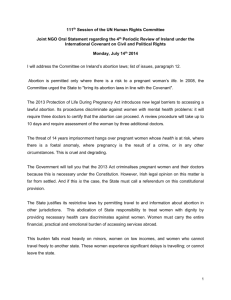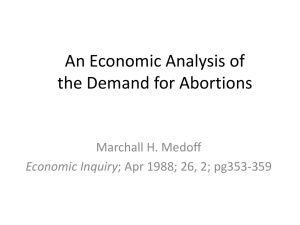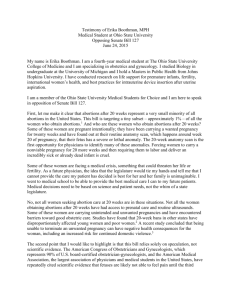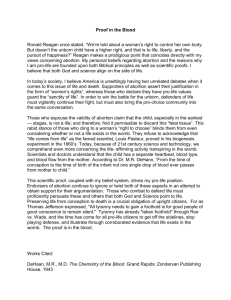Opening Statement to the Joint Oireachtas Committee on Health
advertisement
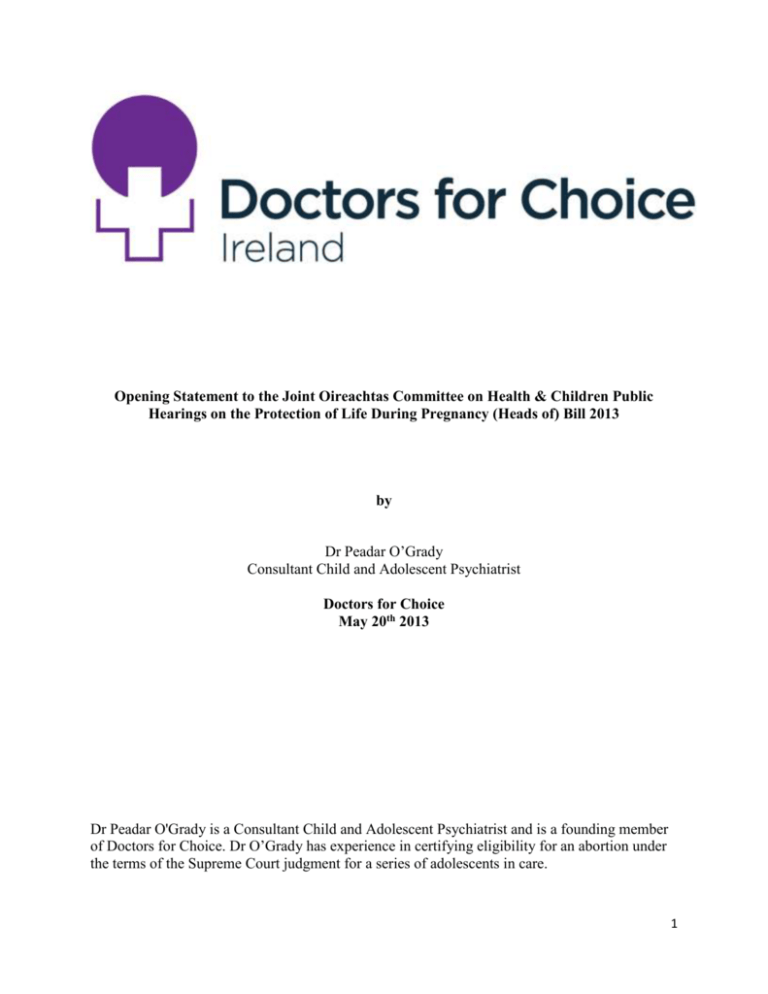
Opening Statement to the Joint Oireachtas Committee on Health & Children Public Hearings on the Protection of Life During Pregnancy (Heads of) Bill 2013 by Dr Peadar O’Grady Consultant Child and Adolescent Psychiatrist Doctors for Choice May 20th 2013 Dr Peadar O'Grady is a Consultant Child and Adolescent Psychiatrist and is a founding member of Doctors for Choice. Dr O’Grady has experience in certifying eligibility for an abortion under the terms of the Supreme Court judgment for a series of adolescents in care. 1 Opening Statement to the Joint Oireachtas Committee on Health & Children Public Hearings on the Protection of Life During Pregnancy (Heads of) Bill 2013 According to the World Health Organisation’s 2012 document Safe Abortion: “In nearly all developed countries, safe abortions are legally available upon request or under broad social and economic grounds, and services are generally easily accessible and available.” In Ireland the proposed legislation to deal with access to abortion services arose out of the Supreme Court judgment in 1992 that a 14-year-old child had a constitutional right to have an abortion in Ireland because of the risk of suicide. Doctors for Choice welcome any improvement in the care of women and children who choose to have an abortion; however we feel reassurance is needed that this Bill will in practice provide an ‘effective and accessible’ procedure in a situation similar to that of the 14-year-old child in the X case. The risk of suicide in the X case arose in a situation where a pregnant child became suicidal when she was unable to travel, having decided to have an abortion while pregnant as the result of rape by an adult neighbour. The opinion of many psychiatrists and other doctors internationally is that the risk of suicide is increased by having access to abortion restricted. The internationally renowned psychiatrist Prof Robert Kendell, summed it up well in his 1991 review in the British Medical Journal: Suicide in pregnancy…much rarer now thanks to contraception, legal abortion and less punitive attitudes. In Ireland restricted access to abortion services is most likely to arise as a result of inability to travel. This means that women who are too sick, young, poor or disabled to travel are at particularly high risk. Women who are migrants or whose pregnancy involves a fatal fetal anomaly or arose as a result of rape or child sexual abuse also experience difficulty accessing abortions through impairment of their ability to travel. Children are not specifically mentioned in the legislation even though they are more likely to experience difficulties in their ability to travel for an abortion and to be at increased risk of suicide as a result. The costs of travel for an abortion are higher for children as they usually require a parent/guardian to travel with them because of their greater requirements for practical and emotional support. Doctors for Choice are particularly concerned that the Bill contains elements that will cause unnecessary delay to access to abortion services causing an unnecessary prolonging of an emergency level of risk and requiring more complicated procedures eg surgical instead of medical abortions. In the case of eligibility for abortion on the basis of a risk of suicide, imposing a requirement for three doctors will cause unnecessary delay. There is no medical basis for differentiating between a medical emergency and a psychiatric emergency. All psychiatric emergencies are medical emergencies. Only one Psychiatrist or GP is required to certify eligibility for an abortion. Obstetricians should not certify eligibility in cases of suicide risk; this should be done either by a GP or a Psychiatrist. 2 The Bill requires the Psychiatrist certifying eligibility to be employed in an institution registered with the Mental Health Commission. Most Consultant Child Psychiatrists are not employed in this way. This is an unnecessary requirement. Specialists are required to be registered with the Medical Council and this should be the only stipulation. Specialists should not be required to be attached to any specific institution. Most abortions in developed health services are medical abortions and do not need any hospital facilities. Women and children in situations of rape, child sexual abuse and fatal fetal anomalies will have to wait for further legislation to allow for the option of abortion in those cases. That this Bill does not provide for this is a serious limitation. There are also valid concerns about the potential for conscientious obstruction. The term ‘reasonable opinion’ should be replaced by the term ‘opinion’ and the term ‘unborn’ should be replaced by the medical term ‘fetus’. Finally, the inclusion of a criminal sanction of up to 14 years against women or doctors will hamper good practice and increase the risk of suicide in vulnerable patients through stigma and its emotional consequences: fear and distress. Fear of prosecution, a noted ‘chilling factor’, can only cause further delays in access. The notion that women who are forced to travel for an abortion in a situation of a fatal fetal anomaly are carrying out the equivalent of a gravely serious crime is particularly offensive. The prospect of prosecuting children and/or their parents or those carrying out a home abortion with medication bought on the internet is also very concerning. The overwhelming support in 1992 for the constitutional right to travel for an abortion confirmed that Irish people do not consider abortion a grave crime; as did the lack of any prosecutions before then for abortions ‘procured’ abroad. To our knowledge, criminal sanction has not been seriously advocated by any party to the debate on access to abortion services. As criminal sanction is dangerous, offensive and manifestly absurd, it should be removed from the Bill. Finally, as there is a gross lack of expertise in Ireland on the provision of abortion services, the Joint Oireachtas Committee on Health and Children should take advice from a relevant healthcare agency that has experience in providing an abortion service. The British Pregnancy Advisory Service (BPAS) provides the majority of abortions availed of by women from Ireland every year and the BPAS has already offered their assistance to the Committee. Dr. Peadar O’Grady, MB, BCh, BAO, MPhil, MRCPsych Consultant Child and Adolescent Psychiatrist Doctors for Choice 2/3 Parnell Square East Dublin 1 Email : doctorsforchoice@gmail.com Website: www.doctorsforchoiceireland.com 3
